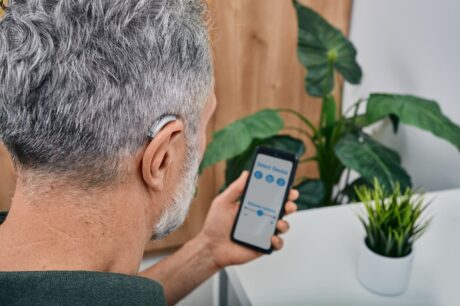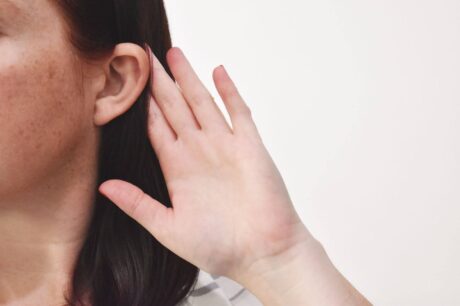Have you ever noticed a painful lump in your earlobe or a bump on your earlobe? While they might seem like minor inconveniences, these ear boils can significantly impact your quality of life and even affect your hearing.
Read on to understand what ear boils are, their causes, symptoms, and how they can affect your hearing health.
What are Ear Boils?
Ear boils, also known as earlobe cysts, are red, swollen, and painful lumps that can develop in the outer ear canal. They often start as small, itchy bumps that gradually grow larger and more painful. In some cases, ear boils can be filled with pus and other fluids.
What do Ear Boils Look Like?
Ear boils have a range of noticeable symptoms, usually evolving as the condition progresses.
- Red, Swollen Lump: Ear boils typically appear as a tender, reddish bump, gradually increasing in size. They can occur anywhere around your ear, such as in your ear canal or on your earlobe.
- Pain and Tenderness: The lump becomes increasingly painful, particularly when touched or pressed.
- Pus-Filled Center: As the ear boil matures, a white or yellowish head may develop, indicating a collection of pus.
- Inflammation and Swelling: The area around the boil can become red, swollen, and tender to the touch.
Causes of Ear Boils
Several factors can contribute to the development of painful ear boils. Bacterial infections are the primary culprit, but other factors also play a role.
Bacterial Infections: The most common cause of ear boils is a bacterial infection, particularly Staphylococcus aureus. This bacteria is commonly found on the skin and can enter the ear through minor breaks or abrasions.
Clogged Hair Follicles: Infected or clogged hair follicles in the ear can also lead to boils. Hair follicles can become clogged with dead skin cells, sweat, and dirt, creating an ideal environment for bacterial growth.
Poor Ear Hygiene: Not cleaning your ears regularly or using improper cleaning techniques can increase the risk of bacterial growth and the chances of earlobe cysts or ear boils. This can disrupt the natural balance of bacteria in the ear canal, allowing harmful bacteria to thrive.
Minor Injuries: Scratches or injuries inside the ear, such as those caused by using cotton swabs or fingernails, can provide an entry point for bacteria. These bacteria can then multiply and cause an infection, leading to the formation of a boil.
Can Ear Boils Affect Your Hearing?
Ear boils can impact your hearing depending on their location. If an ear boil is located within the ear canal, the swelling and inflammation can partially or completely block the ear canal, leading to temporary hearing loss. Additionally, the pain and tenderness can make wearing hearing aids or earphones uncomfortable, affecting your ability to engage in daily activities.
Untreated or ruptured ear boils pose the risk of secondary infections. These infections can spread deeper into the ear canal, potentially causing damage to the delicate structures involved in hearing. In severe cases, large boils or multiple boils can obstruct the auditory canal entirely, leading to a significant decrease in hearing ability.
Ear Boil Treatment and Removal Options
If you suspect you have an ear boil or are experiencing symptoms like a painful earlobe cyst or bump on your earlobe, seeking prompt treatment is crucial to alleviate discomfort and prevent complications. Several treatment options are available, ranging from self-care measures to professional medical intervention.
- Warm Compresses: Applying warm compresses to the affected ear several times a day can help soften the ear boil, promote drainage of pus, and relieve pain. Soak a clean cloth in warm water, wring out excess moisture, and hold it against the ear for 10-15 minutes each time.
- Over-the-Counter Remedies: Over-the-counter pain relievers can help manage pain associated with earlobe lumps. Antiseptic creams may also be applied to the outer ear to help prevent infection.
- Incision and Drainage (I&D): For larger or persistent ear boils, a healthcare professional may perform a minor procedure to drain the boil. This involves making a small incision in the boil to drain the pus and relieve pressure.
- Antibiotics: In cases where the ear boil is caused by a bacterial infection, oral or topical antibiotics may be prescribed to eliminate the infection and promote healing.
- Hearing Assessments: If you experience hearing loss or suspect an ear boil has affected your hearing, an audiologist can evaluate your hearing and recommend appropriate interventions.
Don’t Ignore Potential Bumps and Lumps Around Your Ear

Ear boils can be a painful and potentially harmful condition. Understanding their causes, symptoms, and treatment options is crucial for maintaining good ear health. I
If you’re experiencing any discomfort or notice a bump or lump around your ear that isn’t going away, don’t hesitate to schedule an ear check up in Singapore with Listening Lab. Our team of audiologists can provide comprehensive assessments and personalised treatment plans to address your concerns and ensure optimal ear health.


















